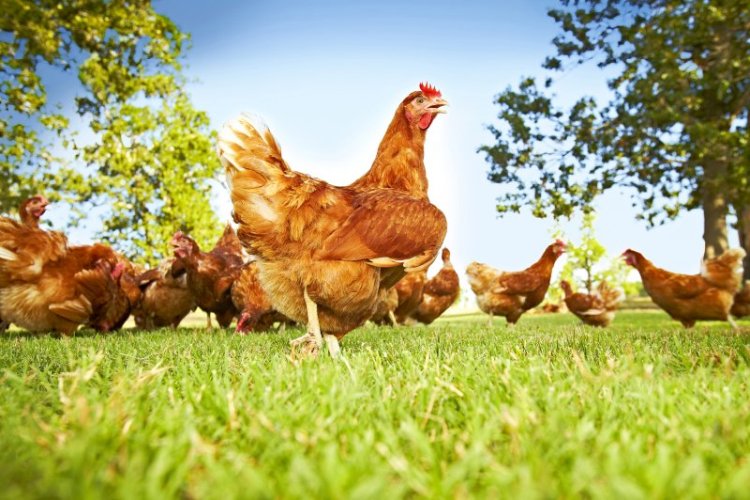Ad watchdog dismisses PETA's complaints against egg brand

The Advertising Standards Authority has thrown out complaints by animal rights campaigners against Noble Foods’ premium Happy Egg brand.
People for the Ethical Treatment of Animals (PETA) and five individuals complained to the watchdog that the description of happy eggs in advertising was misleading.
They claimed that birds were kept in confined, overcrowded spaces and had their beaks trimmed - contrary to the brand’s claim that “free range and happy, natural goodness starts with our hens.”
The advertising claimed “we work hard to keep all our free-range hens happy", giving hens "acres of field to explore, foliage and trees to play in”.
It added "all of our farms exceed free range standards in the UK as set by the RSPCA farm assurance scheme, Freedom Foods". But PETA said this was misleading.
Earlier this year the animal rights organisation issued pictures and video of layers, which it said showed a different picture to the one portrayed by Noble Foods.
PETA said: “While the company’s marketing materials depict happy hens roaming vast green fields covered with foliage and trees, PETA’s footage tells a different story.
"Take a look at the way hens really live on farms supplying the Happy Egg Co." The images gained widespread coverage across the national press.
PETA said the pictures were from three farms in Cumbria, Herefordshire, and Gloucestershire. All three farms are RSPCA Assured farms.
The farms were suspended pending inspection but a spokeswoman for RSPCA Assured revealed that the farms had since been inspected and cleared.
The spokeswoman said: "Following rigorous, physical inspections of all of the farms the next day by an RSPCA farm livestock officer - and a detailed review of the footage by our farm animal specialists - we could not find sufficient evidence to justify keeping two of the farms suspended.
"Therefore, their suspension was lifted. After carrying out a thorough two-week investigation of the third farm, we are satisfied that they have fully rectified all issues identified, including allocating additional staff to help look after the hens.
“Whilst the footage taken five months ago is very upsetting, following our recent visits we can reassure people that the birds on all three farms are being properly cared for to the RSPCA’s welfare standards.
"However, as an extra precaution, they will be subject to additional unannounced visits over the coming months,” she said.
Despite this, PETA's campaigners pursued an objection with the Advertising Standards Authority (ASA), the UK's advertisement watchdog.
However, this complaint has now been thrown out and no action will be taken against Noble Foods.
The judgement from the ASA referred to PETA’s complaints about the three farms.
The ASA said in its ruling: “They (PETA) had inspected three supplier farms between 15 September and 26 October 2020 and shared video footage of the farms.
“They believed the footage indicated that the farms inspected did not exceed, and in some cases failed to meet, RSPCA Assured farm standards.
"We noted that two of the farms were reinstated the next day after an inspection showed they had met RSPCA Assured farm standards and that the third farm was also reinstated. by the RSPCA after two weeks.
"While one of the farms was determined by the RSPCA to have failed their assured farm standards, we did not consider that was in itself indicative that Happy Egg Co supplier farms did not meet those standards.”
It said the evidence “demonstrated that there were comprehensive measures in place to ensure that all of the Happy Egg Co’s supplier farms provided hens with access to outdoor spaces and greenery, and satisfied the RSPCA Assured farm standards for free range hens."
The ASA said: "We noted that Happy Egg Co stated that they encouraged their suppliers to use the activity kits they had developed to enhance hens’ stimulation and natural behaviours.
"It was not clear whether those kits were of a standard that exceeded the minimum requirements for enrichment activities set by the RSPCA, or what proportion of supplier farms used them in practice.
“However, we noted that all of the supplier farms of Happy Egg Co exceeded the 5% natural cover requirement set out by RSPCA welfare standards for laying hens, as referred to by PETA and Happy Egg Co to determine RSPCA Assured farm status, with the vast majority having at least 20% natural cover."
The watchdog pointed out in its ruling that it had initially investigated another issue - the depiction of hens with untrimmed beaks on the Happy Egg web site.
It said that, following receipt of the complaints, Happy Egg removed the images showing hens with untrimmed beaks from their site and so the issue was resolved informally.








